Thinkific is a popular platform for course creation.
But, it’s not an all-in-one platform and misses certain features like the ability to create feature-rich communities.
Additionally, their mobile apps leave a lot to be desired.
As an experienced instructional designer who has used various course creation platforms over the past 3 to 4 years, I’ll review some of the best alternatives to Thinkific in this blog post.
Let’s review some of these platforms:
| Product name | All-in-one platform | Community support | Mobile apps | Pricing |
| Podia | Yes | Limited | No | From $39/month |
| Kajabi | Yes | Yes | Yes | From $89/month |
| Circle | No | Yes | No | From $89/month |
| Teachable | Yes | Limited | Yes | From $39/month |
| Mighty Networks | Yes | Yes | Yes | From $49/month |
Podia – All-in-one affordable alternative
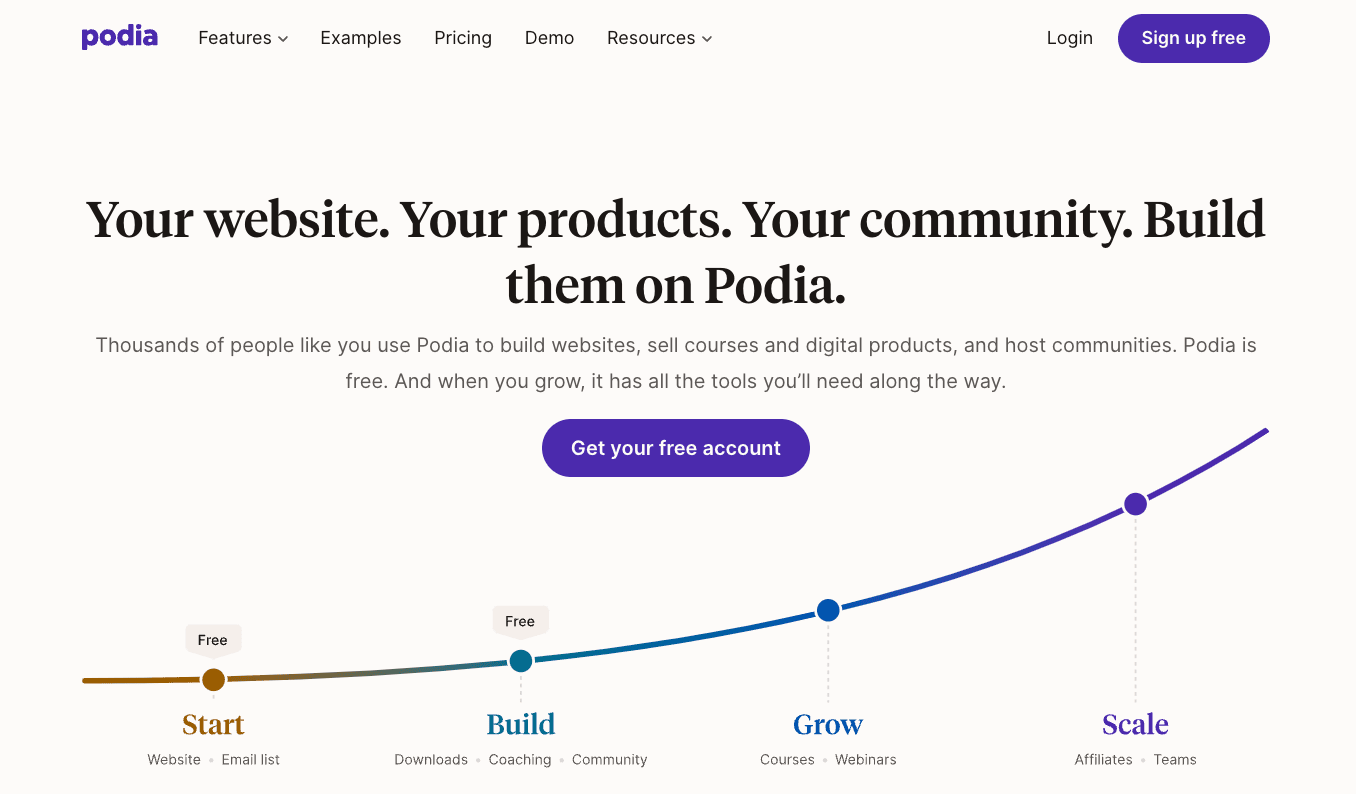
Podia markets itself as an all-in-one platform for selling online courses, communities, webinars, coachings, and digital downloads.
Features:
- Courses: Podia has essential features such as unlimited video hosting, drip feed, and quizzes, but lacks student-level engagement analytics and video heat maps.
- Digital products: Podia allows the creation and embedding of digital products on your website.
- Coaching: Podia supports multiple coaching sessions and calendar embedding for easy booking.
- Webinar integration: Podia integrates with Zoom and YouTube Live.
- Email marketing: Podia offers email marketing capabilities.
- Website chat: Podia features an embeddable chat widget for your website.
- Affiliate marketing: Podia supports basic affiliate marketing with adjustable commission rates.
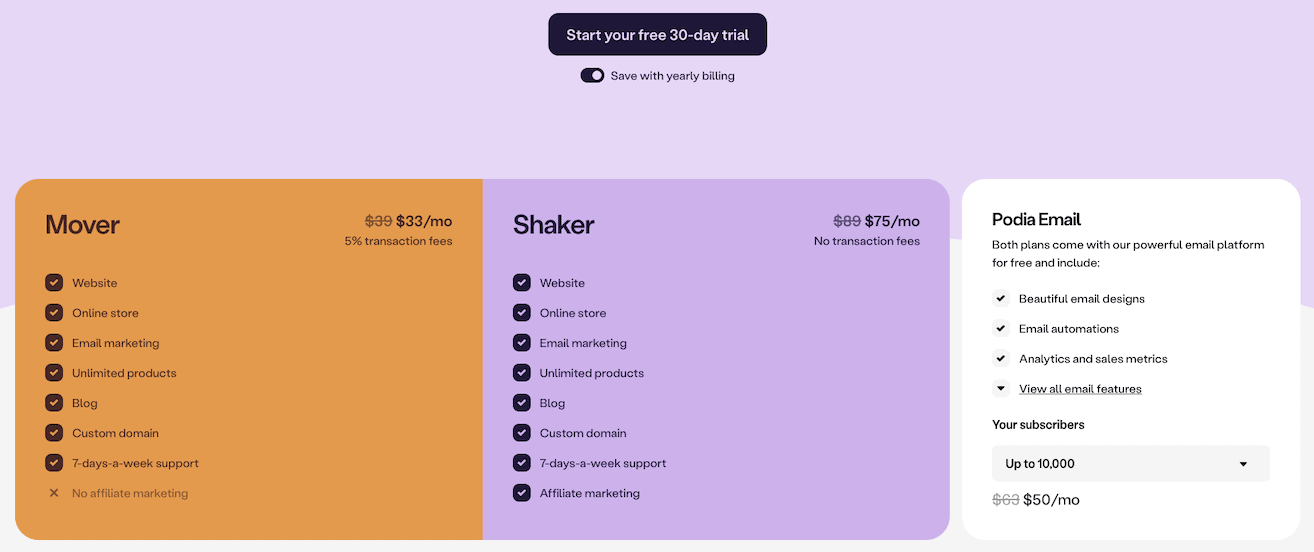
Podia keeps pricing super simple: try it free for 30 days, then pick from two paid plans.
The Mover plan ($39/mo) includes a 5% transaction fee.
Want to get rid of that fee?And get affiliates feature?
You’ll need to upgrade to the Shaker plan at $89/mo.
Pros 👍
- All-in-one platform
- User-friendly interface with attention to detail
- Unlimited courses and products with unlimited storage and bandwidth
- Ability to sell digital products
- Supports embeddable checkouts and upsells on external websites
- Includes a built-in email marketing tool that supports broadcasts and campaigns.
Cons 👎
- Doesn’t have a mobile app
- Limited depth of features
- Free plan comes with an 8% fee
- Additional features like webinars and affiliate program require a higher-priced plan
Their lack of mobile app is a real big downside.
🏆 Bottomline: Podia is a good all-in-one alternative to Thinkific. It offers a broad range of features, including courses, coaching, communities, and digital product selling. However, the features lack depth and it doesn’t have a mobile app! If you value simplicity and prioritize “getting things done” over obsessing about extra specialist features, then Podia may be the right choice for you.
Kajabi – The best all-in-one alternative

Kajabi is one of the most premium, all-in-one digital selling platforms.
Here are some standout features of Kajabi:
- Sales funnel option
- Marketing automation
- Feature rich website builder
- Kajabi Events (inbuilt webinars)
- Email marketing
- Community feature (with gamification options)
As an all-in-one platform, all its features integrate with each other, leading to new emergent possibilities.

For instance, as you can see in the above screenshot, whenever a lesson is completed, an email can be triggered that might reward the student, or perhaps register them for an event.
The possibilities are endless.
Added on top:
Kajabi offers great community features (it’s the best in this list).
It recently acquired Vibely, an online community platform that allows you to create highly engaging gamified communities.
This includes features such as:
- Live rooms (meetups)
- Challenges
- Accomplishments
- Badges
- Points
- And more
Also it has both iOS and Android apps, which support push notifications and in-app purchases (wow!). This is a big advantage as it helps with community engagement and profit maximization.
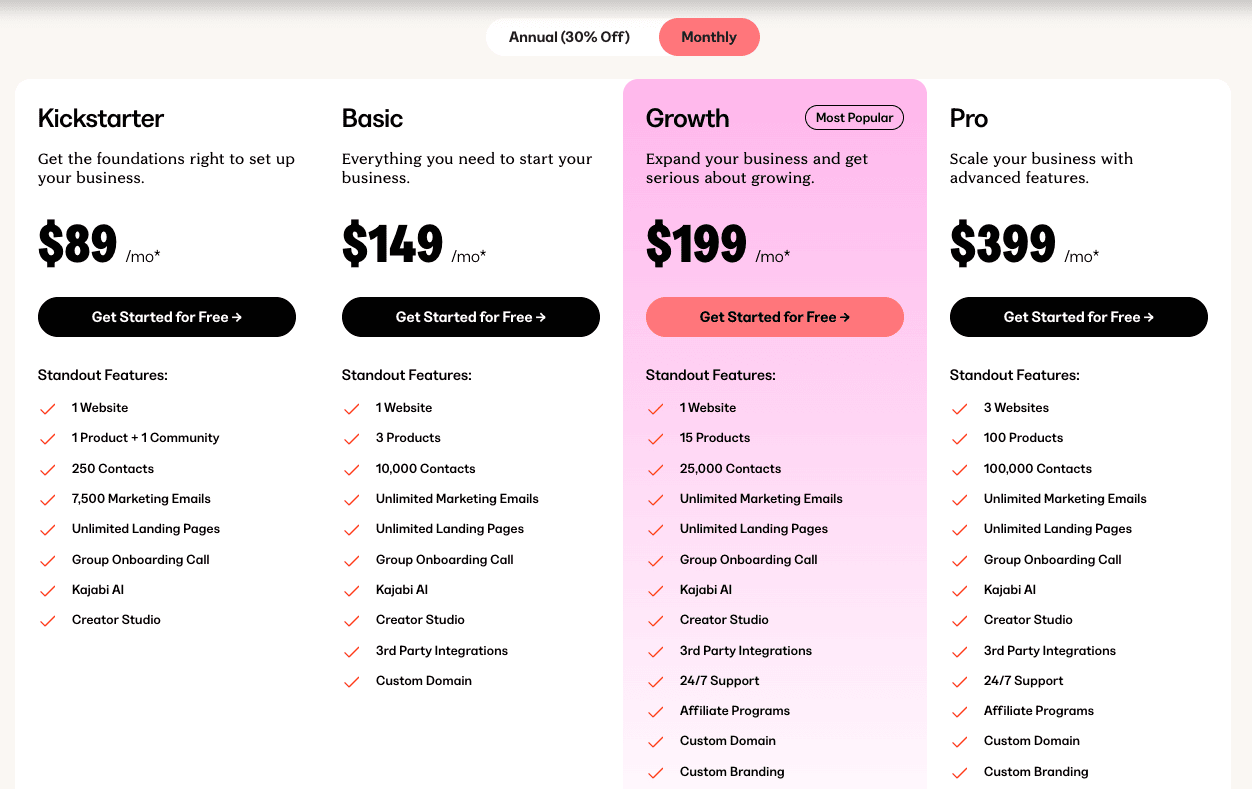
Their Kickstarter plan starts at $89 per month and only supports the creation of 1 product.
👎 Even their basic plan at $149 per month supports only 3 products and funnels, which can be a bummer if you plan to include more free courses or tripwires.
For most people, they end up choosing the Growth plan at $199 per month, which allows you to create up to 15 products.
This would be enough for most people.
Pros 👍
- All-in-one platform with good depth to features
- Automation engine to glue all their features together
- Feature-rich community feature with gamification engine on top
- Feature-rich mobile and iOS apps
Cons 👎
- Premium pricing
- Their Basic plan even at $149/month has to create only 3 products
🏆 Bottomline: If you’re seeking an advanced, all-in-one platform and willing to pay more, Kajabi is worthwhile. Despite its cost, its extensive features can save money on email marketing software, landing page builders, and community platforms.
Circle – Community-centric alternative
Circle is one of the newest community-centric course platforms out there.
It was launched in 2019 by Sid Yadav, who is Teachable’s first designer, and later backed by Ankur Nagpal (invested 90% of his liquid net-worth), the founder of Teachable.
The major standout with Circle is their intuitive UI and UX.
Their product development is informed by the success of cutting-edge startups like Slack and Notion.

Currently, Circle focuses primarily on communities and courses.
Additionally, they’re implementing “Community AI” to enhance community management and gamification.
Pricing starts at $89/month for the Professional plan, which includes member profiles, courses, and live streams – ideal for solo creators and small teams.
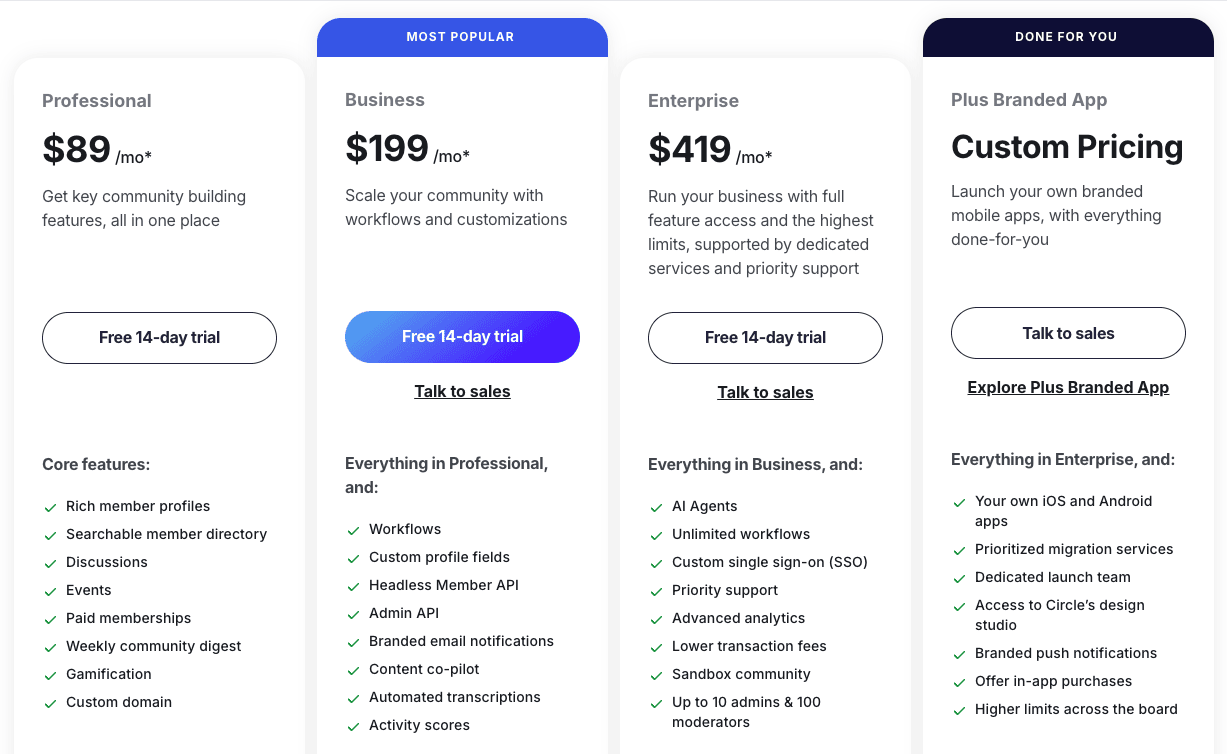
If you need more advanced features?
The Business plan at $199/month hooks you up with workflows, custom profile fields, APIs, and branded notifications.
They’re expanding their platform with mobile apps, built-in live streaming, and powerful automation workflows for community management. These automation features function similar to having Zapier integrated directly into your community.
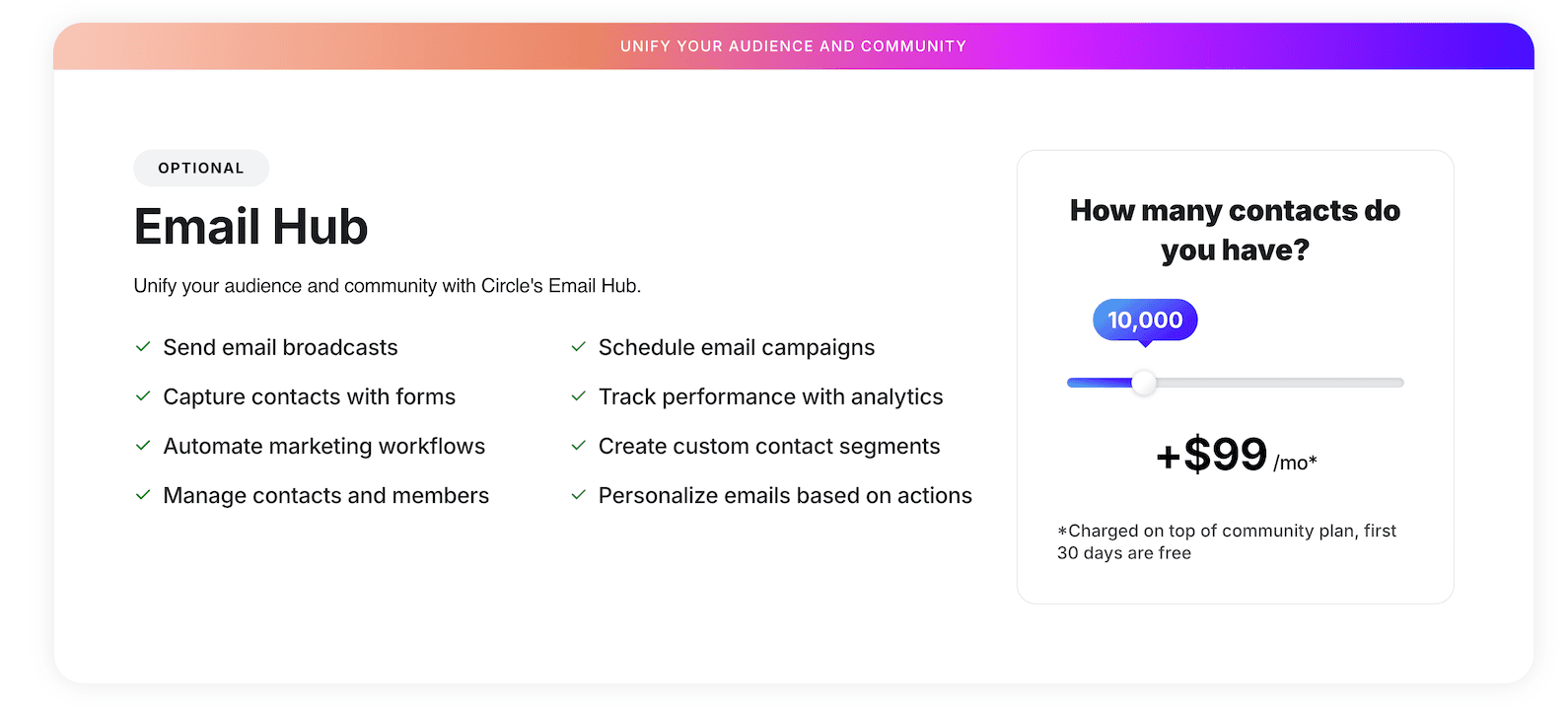
Circle has also introduced an Email Hub functionality with email marketing capabilities built into the platform, aiming to become a more comprehensive all-in-one solution.
3 things they’re not upfront about:
- All their plans are billed annually (see the asterisk *)
- They don’t mention the transaction fee anywhere on the pricing page
- They don’t clearly mention how many workflows you actually get with their Business plan.
For larger organizations, the Enterprise plan costs $419/month and gives you everything plus AI agents, full API control, SSO, priority support, and advanced analytics.
Pros 👍
- Intuitive UI and UX which is not cluttered
- Commendable speed of implementation of features
- Automation workflows enabling you to automate workflows and perform bulk actions (think of Zapier)
- Community AI features
Cons 👎
- Premium pricing
- Lacks of website building and email marketing features
🏆 Bottomline: If you are looking for a community centric platform with really good flexibility when it comes to customization and design, then you need to go with Circle. It is backed by the former team of Teachable and they know what they are doing.
Teachable – Closest alternative (with mobile app)

Teachable is the most popular LMS platforms out there.
It’s a specialist in course creation, offering all the essential features such as courses, quizzes, assessments, and in-depth analytics and reports on course progress.
In addition to courses, Teachable also supports coachings, course bundles, and digital downloads.
Also, more recently, they introduced communities feature that enables you to create a community with different discussion areas to facilitate community interaction, but it still lacks a lot of features.
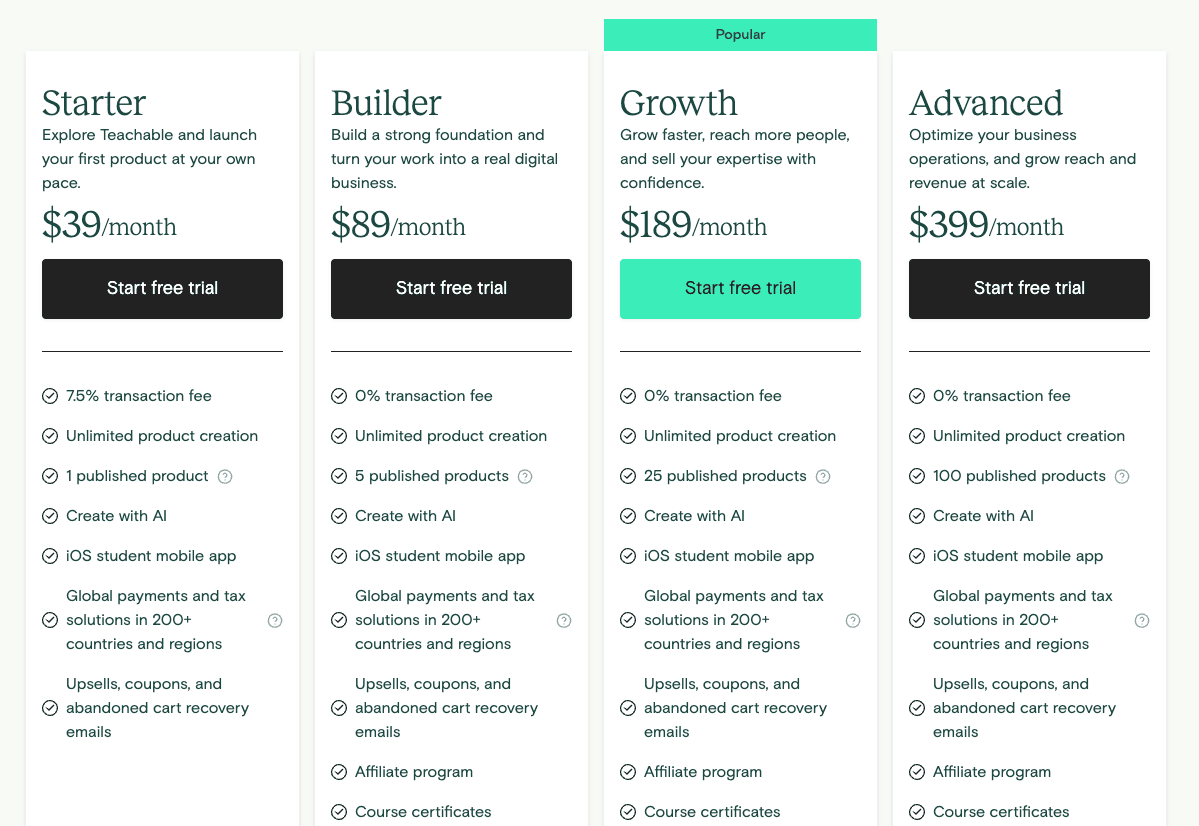
Teachable hits you with a huge 7.5% transaction fee on their Starter plan ($39/mo).
Want to get rid of that fee? You’ll need to upgrade to their pricier plans.
You can create unlimited draft products across all Teachable plans.
But published product limits are strict: Starter ($39/mo) allows just 1, Builder ($89/mo) gives you 5, Growth ($189/mo) lets you publish 25, and Advanced ($399/mo) caps at 100.
🏆 Bottomline: Teachable has lost a lot of its charm ever since it was acquired by Hotmart and founders shifted their focus to Circle. Today I won’t recommend Teachable instead you can consider other alternatives that I have mentioned in this blog post.
Mighty Networks

Mighty Networks (read review) is an online community platform that also comes with feature-rich course builder.
Its communities have features like:
- Private spaces: You can create spaces that are public, private, or secret.
- Chat features: Enables private messages, group chats, and direct messages.
- Real-time interaction: Similar to Whatsapp, members can see who is online and connect with them in real-time.
- Live streaming: You can create live meetups, QAs, paid events, and masterclasses inside of the spaces.
It is a community first platform.
But it has a decent course builder that supports both online courses and cohort courses. Also, it supports drip scheduling of the content.
The best part?
Mighty Networks has a really awesome mobile app. It’s feature-rich and actually enables users to engage in it more often.
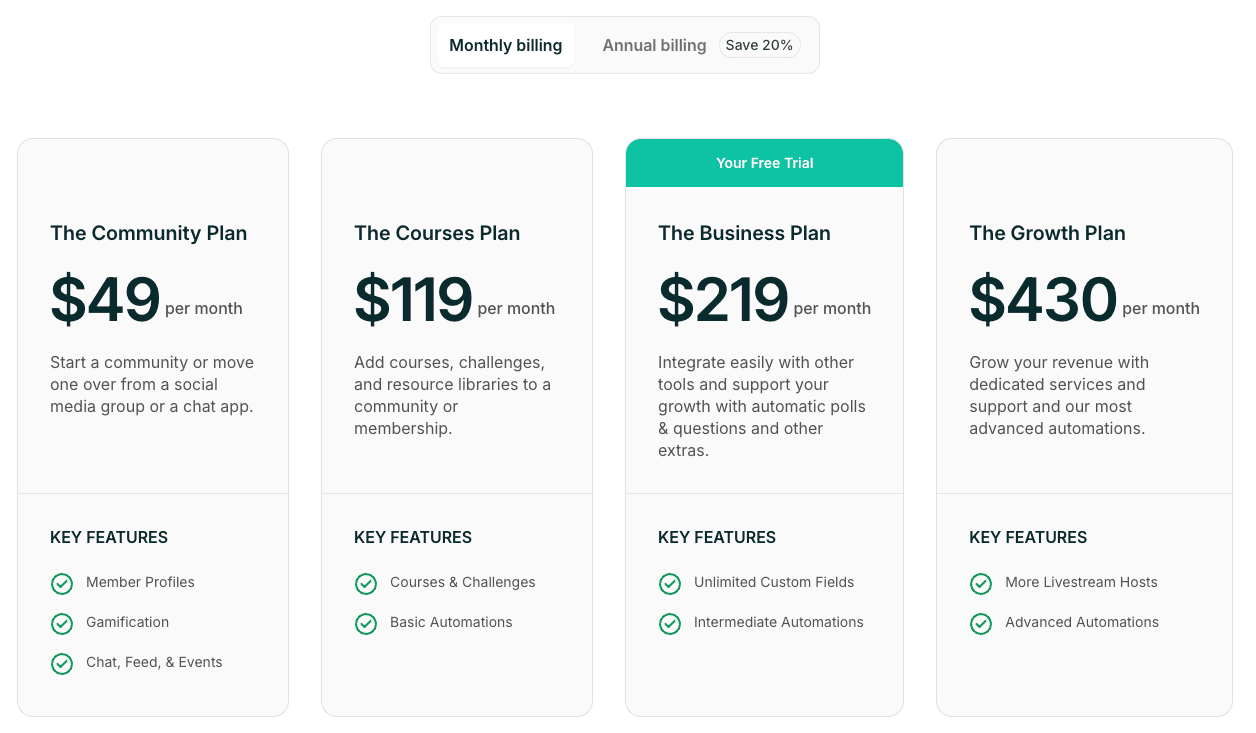
Mighty Network’s Community plan costs $49 per month. To access courses, you need to go with its Courses plan at $119 per month.
🏆 Bottomline: If your main focus is on creating course-specific communities and advanced LMS features may not matter much to you, Mighty Networks would be the go to choice. But do note that their UI/UX leaves a lot of be improved.
FreshLearn

FreshLearn is an all-in-one platform built for course creators, entrepreneurs, and business owners.
Features:
- Course flexibility: You can create both on-demand and cohort courses.. Add videos, documents, text, images, quizzes, and graded assessments. It even has advanced features like negative scoring and question randomization.
- Course gamification: Even though FreshLearn doesn’t have communities, it makes up for it with gamification features for courses – points, rewards, quizzes, and challenges.
- Certification options: You get course completion certificates and drip scheduling options.
- Marketing tools: FreshLearn offers coupons and affiliates to help you promote your courses.
- Payment integration: It integrates smoothly with Stripe, PayPal, and Razorpay (Indian gateway) for hassle-free transactions.
- Affordable pricing: Its premium pricing starts at $29 per month, with the highest plan costing $59 per month.
🏆 Bottomline: FreshLearn is a versatile platform that offers a range of features without a steep price. If you’re looking for an affordable course creation platform, it’s worth considering.
LearnWorlds – For academic trainers

LearnWorlds (read complete review) is a great LMS tool suited for academic-centric courses.
This is the only tool on this list that is SCORM-compliant.
To engage learners, it has features like:
- Interactive videos
- Ebooks
- 1:1 & group sessions
- Assessments
- Certificates
- Surveys
- And much more
For marketing, it has upsells, cross-sales, high-converting sales pages, 1-click funnels, and customizable checkout experiences.
It has a dedicated site builder (with Funnels feature) that’s pretty robust that allows you to completely customize your academy. There are more than 50 industry-specific site templates available in various niches!
For mobile-focused users, you can get custom branded school apps are available with in-app purchases, push notifications, and white-labeling!
And pricing:
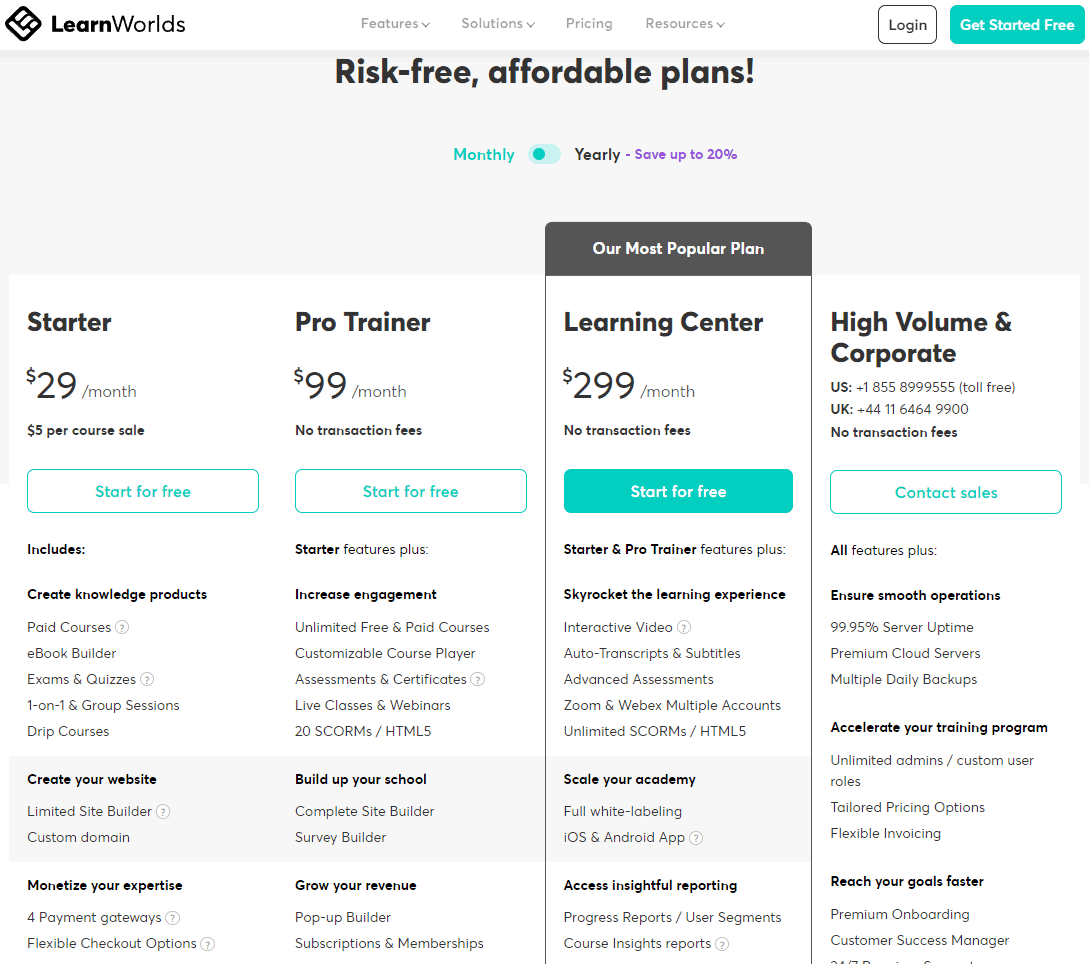
If you want to access their unique features such as interactive videos, auto transcripts, advanced assessments, and even SCORMS and HTML5, you need to subscribe to their Learning Center plan, which costs $299 per month.
🏆 Bottomline:LearnWorlds is best suited for academic-centric courses. Although LearnWorlds offers many features, but some users may find them overwhelming and difficult to navigate. Additionally, the user experience may not be as smooth as other platforms.
LearnDash – Best WordPress LMS

LearnDash is a popular and highly versatile LMS for WordPress.
It’s built for WordPress users who have some tech know-how, since there’s a learning curve and you’ll need WordPress experience to use it well.
What makes it special? It has tons of addons and integrations with other WordPress plugins, giving you almost endless customization options.
For example, you can connect it with WooCommerce for payments, Elementor for design customization, and Gamipress to make your courses more engaging.
If you’re creating online courses, LearnDash won’t break the bank. Pricing starts at $199/year for a single site license, and their support team is responsive. Plus, they have a very active Facebook group where you can get help from other users.
🏆 Bottomline:LearnDash is ideal for technically adept WordPress users due to its versatility and customizability for developing online courses. However, it may not suit those needing email marketing, automation, or digital product sales features.
Teachery
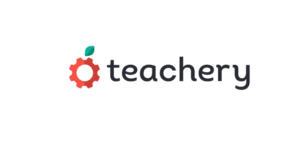
Teachery is an affordable and user-friendly course creation platform that can be compared to Thinkific. It offers two design templates for creating courses: minimal (for basic courses) and sidebar (for long content courses) templates.
The platform does not have built-in hosting, so users have to use Vimeo or Wistia to host their files and add content using embed codes. However, Teachery stands out from other LMS tools as it supports drip scheduling for both lessons and sub-lessons.
It also provides marketing features such as coupons, discounts, upsells, checkouts, email marketing, and affiliates. For a detailed exploration of all the features, refer to my Teachery review post.
Teachery offers both monthly and yearly plans, costing $49/month and $470/year, respectively. Which is quite high considering that it doesn’t come with video hosting feature.
Conclusion
When it comes to Thinkific alternatives, I would advise you to avoid Teachable due to their recent ownership and controversial pricing changes, as well as their future roadmap.
Instead, you may want to consider all-in-one platforms like Kajabi or Podia. If Kajabi’s $199 per month price tag is too steep, Podia is another all-in-one platform option (but lacks depth and mobile app).






